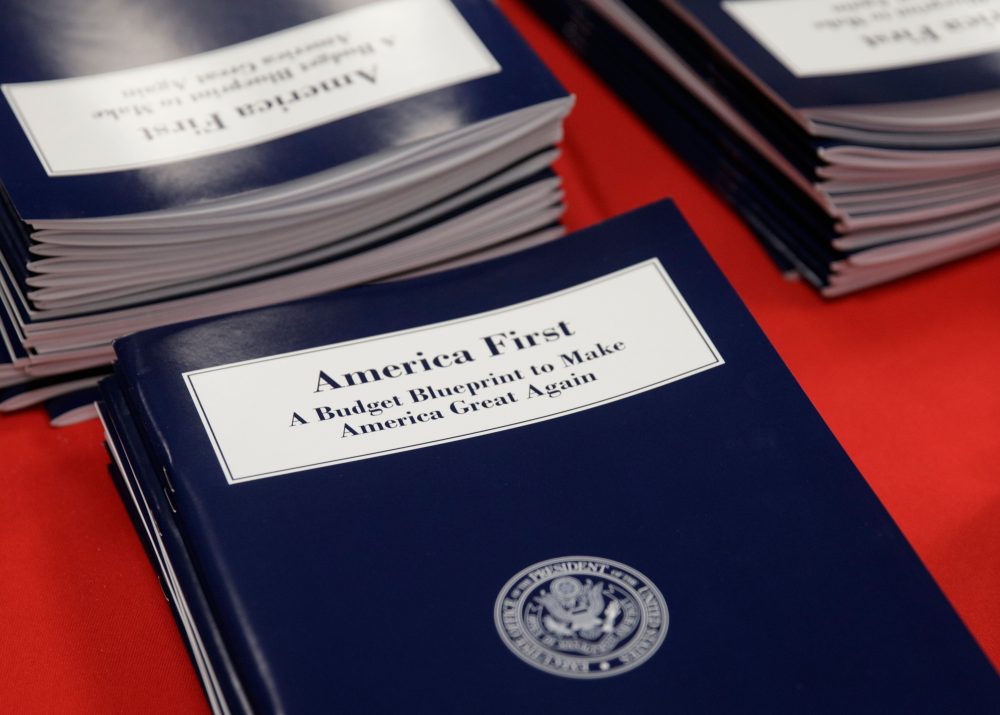Advertisement
Mass. Advocates Decry Trump's Budget Blueprint

President Trump's first budget blueprint — more a statement of priorities than predictor of actual federal spending — was met by strong criticism from public officials and community advocates in Massachusetts for seeking to slash domestic programs.
The proposal, released Thursday, "calls for significant increases in military and border security spending, along with corresponding cuts in many other parts of the government," as NPR reports.
The plan would boost Department of Defense spending by $54 billion, with smaller increases for the Homeland Security and Veterans Affairs departments.
Office of Management and Budget Director Mick Mulvaney told reporters the blueprint was designed to "send a message to our allies and our potential adversaries that this is a strong-power administration."
But, as NPR and other observers noted, Congress ultimately controls the nation's purse strings. And local community advocates told WBUR they too doubt the White House plan will come to fruition.
Nevertheless, Boston Mayor Marty Walsh, a Democrat, said in a statement that the president's blueprint "puts cities across America and our residents last."
Gov. Charlie Baker, a Republican, told WGBH-FM that "[t]here are a lot of things in this [proposal] that concern me."
Baker called cuts to the National Institutes of Health "particularly alarming." He said: "It's not just bad for Massachusetts, it's bad for the country."
Trump's plan calls for a cut of $5.8 billion from the NIH's $30 billion budget. Massachusetts gets more NIH funding per capita than any other state.
Members of Massachusetts' all-Democratic congressional delegation, including Sen. Ed Markey and Reps. Joe Kennedy III and Niki Tsongas, also blasted the blueprint for its proposed cuts to domestic programs.
The budget proposal pinpoints the U.S. Department of Housing and Urban Development for cuts, trimming 13 percent, or $6.2 billion. The agency is responsible for developing and revitalizing urban centers and multifamily housing, as well as enforcing fair housing laws.
“While the president’s budget is highly unlikely to pass, we are still deeply concerned that Congress will enact draconian cuts to domestic spending,” Kriesberg said. “It’s going to hurt the most vulnerable, including the disabled and the elderly. They’re even going after veterans’ housing, which is shocking.”
Within HUD, the budget plan would eliminate the $3 billion in funding for the Community Development Block Grant program, which helps support, for instance, the anti-poverty initiative Meals on Wheels.
Ethos, a Meals on Wheels provider in Boston, said its program, which feeds about 1,000 seniors every day, would grind to a halt if the cuts were realized.
"Ninety percent of [our clients] are frail, homebound elders who are incapable of preparing a meal for themselves," said Dale Mitchell, executive director of Ethos. "I don't know how you define need more graphically than that."
Additionally, the proposed cuts would eliminate the AmeriCorps program. City Year, a program that started in Boston more than 20 years ago, partners with AmeriCorps. Its founder, Michael Brown, called Trump's proposal short-sighted, adding that the volunteer program should instead be expanded.
"If our election has shown us anything, we need more empathy in this country," he said. "And it's time to actually take national service to scale, not a time to be thinking about cutting or eliminating it."
The Trump administration said Thursday that programs targeted for cuts are ineffective.
With reporting from WBUR's Simón Rios, Lisa Creamer, Asma Khalid and its Newscast Unit, and with additional reporting by State House News Service
This article was originally published on March 16, 2017.
